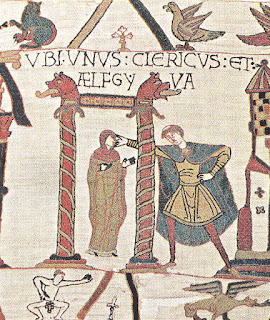Henslowe writes: R at william the conkerer the 4 of Jenewary 1593 ... xxijs
In modern English: Received at William the Conqueror, 4th January, 1594 ... 22 shillings
 |
| William the Conqueror, depicted in the Bayeux Tapestry |
It's not certain William the Conqueror was Fair Em. After all, the two plays were owned by different playing companies: the title page of Fair Em's printed text states that it was performed by Lord Strange's Men, the previous incumbents of the Rose. But since Strange's Men had broken up by this point, and since it's theorized that some of its members became part of Sussex's Men, we can postulate that a play from the former company might have ended up being been performed by the latter.
Here, then, is a description of Fair Em. Even if it wasn't the same play, it may tell us something about what the one performed at the Rose today was like.
If the play was Fair Em
As you can tell from its title, Fair Em, the Miller's Daughter of Manchester; with the Love of William the Conqueror contains two storylines. The title also hints that the focus is on William's romantic escapades rather than the Battle of Hastings.
 |
| A man and a woman in the Bayeux Tapestry |
William falls in love instead with Mariana, a Swethian princess held captive by the Danes. Blanche becomes jealous and Mariana is not interested in William at all, so the whole thing is getting quite messy.
Mariana persuades the lovestruck William to help her escape in disguise, but she arranges things so that Blanche (her face hidden by a mask) is the woman who actually accompanies William back to England. William doesn't notice that the women have swapped places until much later when the angry Danes invade England to get Blanche back. The King of Denmark tries to forge peace by offering Blanche to William as a bride, but by this point William has become a confirmed woman-hater: "utterly I do abhor their sex," he announces, "they are all disloyal, unconstant - all unjust!".
 |
| Shambles Square, a fragment of old Manchester in the heart of the city . Photo by Richerman at English Wikipedia, CC BY-SA 3.0. |
Em, as the title indicates, is beautiful, and attracts many suitors despite her humble status, including a local gentleman named Manville, and two Normans, Mountney and Valingford. Manville is Em's preferred choice, so she tries to dissuade the other suitors by faking blindness and deafness. This certainly succeeds in repelling Mountney, but unfortunately for Em it repels Manville too, who decides to chase another woman instead. Only Valingford is revealed to be the only loyal wooer.
In the play's conclusion, Em and her suitors appear before King William the Conqueror for judgement. Em reveals that she's not really blind and deaf. Seeing this, Manville switches his affections back to her, but by this point, Em has decided she no longer wants a fickle suitor and prefers Valingford. Of course, this is tricky, because she's only a miller's daughter, and he's a Norman lord. But when it is revealed that her father is in fact a disguised nobleman, that makes everything all right.
The two plots are finally knitted together when King William is so impressed by Em's virtue that his misogyny crumbles away and he recognizes that he should have loved Blanche all along. A royal wedding is thus in the offing, and in the play's last lines, King William announces,
Then here, Lord Valingford, receive fair Em;
Here, take her, make her thy espousèd wife.
Here go we in, that preparation may be made
To see these nuptials solemnly performed.
If you would like to read Fair Em, take a look at Brett Greatley-Hirsch and Kevin Quarmby's in-progress online edition at Digital Renaissance Editions. If you prefer print, Standish Henning's 1980 edition is the most readable edition, although it's hard to find.
What we learn from this
Fair Em reminds us that it's hard to speculate about a play's nature from its title alone. We might assume that a play called William the Conqueror would have told the story of the Battle of Hastings and the conquest of England. But Fair Em tells us that it could instead have been a wacky romantic comedy, with the Norman conquest used only as an excuse for yet another tale about noblemen disguised as commoners.
Whether or not William the Conqueror was Fair Em, it was performed only once by Sussex's Men at the Rose. If the company was expecting a big audience for this newly-introduced play, they were sorely disappointed with a theatre less than half full, and they never performed it again.
FURTHER READING
Fair Em information
- Standish Henning, ed. Fair Em: A Critical Edition (Garland, 1980)
- Martin Wiggins, British Drama, 1533-1642: A Catalogue, vol. 3 (Oxford University Press, 2013), entry 852.
- Lawrence Manley and Sally-Beth MacLean, Lord Strange's Men and their Plays (Yale University Press, 2014)
William the Conqueror information
- Martin Wiggins, British Drama, 1533-1642: A Catalogue, vol. 3 (Oxford University Press, 2013), entry 903.
- Matthew Steggle, "William the Conqueror", Lost Plays Database (2016).
Henslowe links
- Transcript of this page of the Diary (from W.W. Greg's 1904 edition)
- Facsimile of this page of the Diary (from the Henslowe-Alleyn Digitisation Project)
Comments?
Did I make a mistake? Do you have a question? Have you anything to add? Please post a comment below!
No comments:
Post a Comment